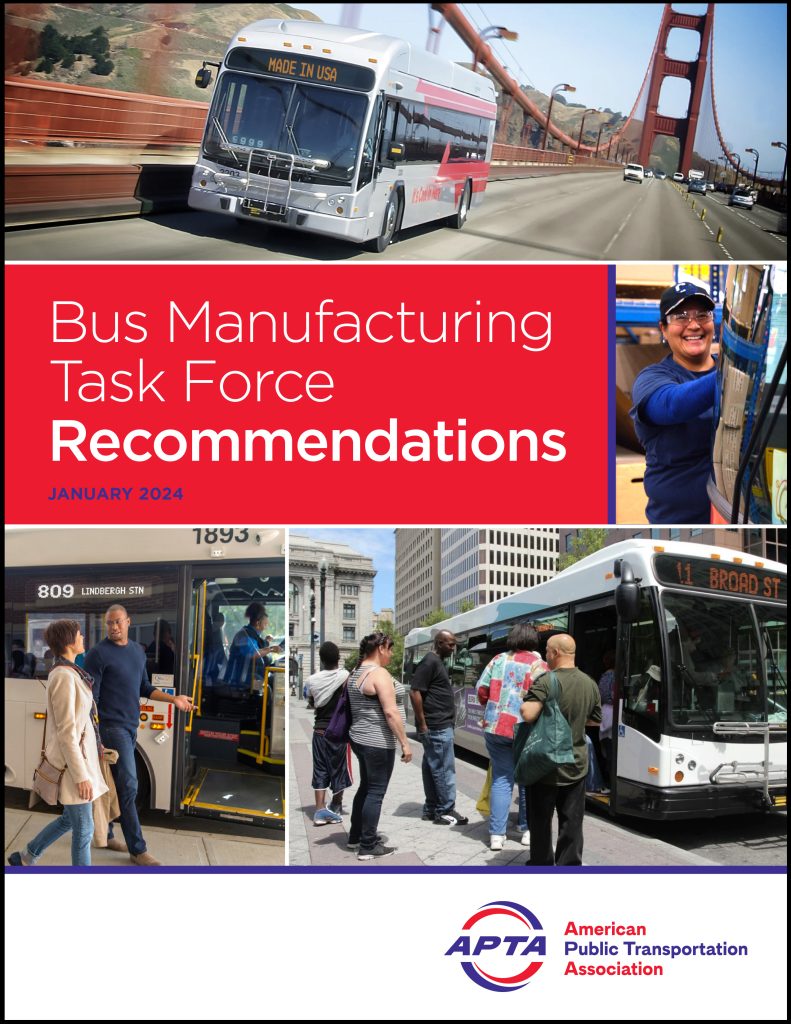APTA Joins White House Roundtable on Clean Buses, Releases Recommendations to Strengthen U.S. Bus Manufacturing
2/8/2024

APTA met with the Biden-Harris Administration, including officials from the White House, FTA, and other federal agencies—as well as representatives from suppliers, manufacturers, regional transit agencies, labor groups, and other stakeholders— at the White House Roundtable on Clean Bus Manufacturing Feb. 7 to address challenges facing the U.S. bus manufacturing industry.
APTA presented measures that could be taken immediately to fortify a more competitive and stable domestic bus manufacturing industry. The recommendations, developed by APTA’s Bus Manufacturing Task Force, will help ensure U.S. capacity to manufacture and deliver clean buses at the scale and pace needed to meet market demands and achieve national climate and equity goals while reducing costs for manufacturers and transit agencies.
Established in October 2023, the task force is led by Dorval R. Carter, Jr., former APTA chair and president, Chicago Transit Authority. The vice chair is Richard A. Davey, president, New York City Transit. Task force members represent a diverse constituency of the public transportation industry.
To help address immediate cash-flow shortages, the task force recommends that public transit agencies incorporate three changes in bus contracts: price adjustments, progress payments, and use of price indices. Other immediate actions include developing a set of bus procurement best practices and exploring ways to reduce customization in bus design, which can increase costs and delay the procurement cycle.
The task force also outlined several longer-term approaches to enhancing competition and to funding the transition to zero-emission fleets. Read the full list of recommendations here.
“We thank the Biden-Harris Administration for collaborating with APTA and its member U.S. transit agencies, bus manufacturers, and bus component suppliers in a critical dialogue to help tackle our industry’s current challenges during its shift toward clean bus manufacturing and deployment in the United States,” said APTA President and CEO Paul P. Skoutelas. “Preserving, protecting, and nurturing a highly competitive U.S. bus manufacturing market and building the capacity to transition to low- and zero-emission buses is essential.”
President Biden’s Bipartisan Infrastructure Law invests $5.6 billion to support the purchase of cleaner American-made buses, train the transit workforce, and upgrade fueling and maintenance infrastructure.
“Converting to low- and zero-emission buses and building the necessary charging and fueling infrastructure will deliver substantial operational and maintenance savings, make our communities healthier and more equitable, and support national climate goals,” Skoutelas added. “But the transition comes with challenges. Today’s productive discussion with the Biden-Harris Administration and other key partners underscores the critical need for ongoing cooperation around next-generation public transportation to ensure America’s future strength, success, and prosperity.”